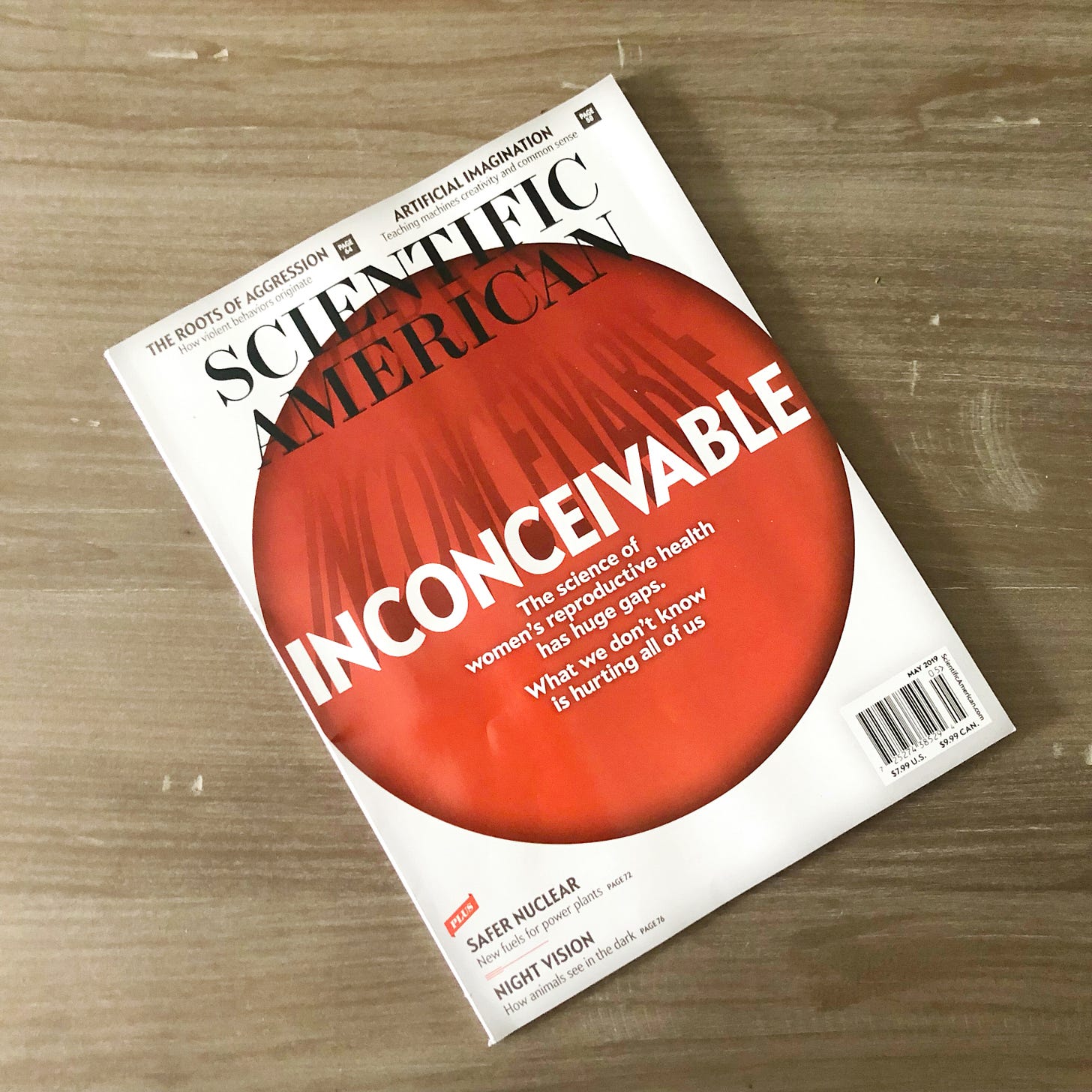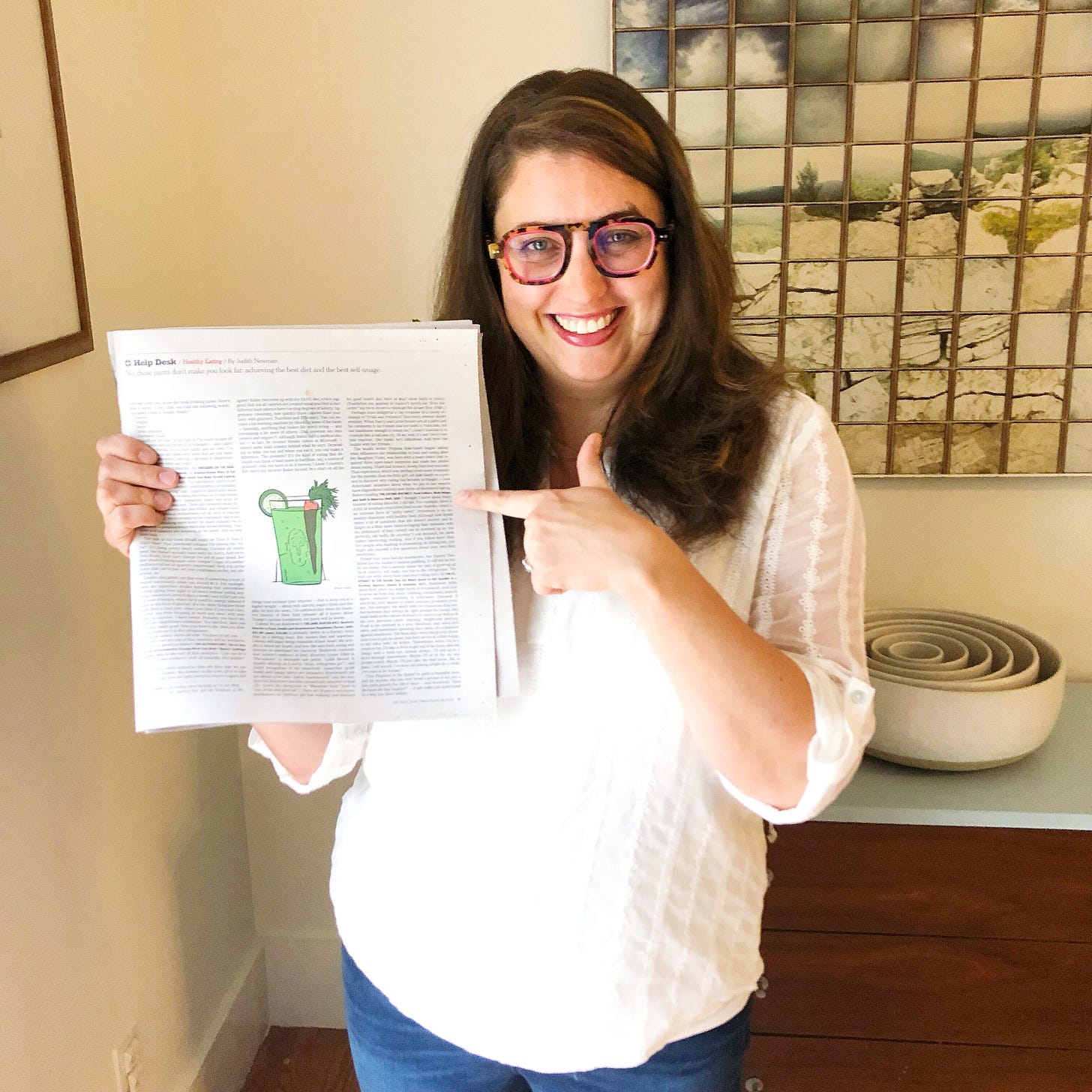What's Behind The Pay Wall?
Rigorous feminist journalism and someone who made sure we spelled it right.
I'm very thrilled to have the cover story in Scientific American's brilliant May issue, which is devoted to reproductive health issues. If you're a newer reader of my work, you may think I'm all about food, but really, I'm all about women's relationships with our bodies — and our relationship to menstruation and sexuality has long fascinated me. Our taboos and restrictions around reproductive health have many parallels with the rules we set for ourselves around food and weight, so it's all "on brand" as the kids say.
And I learned so much reporting this new piece — like the fact that humans, chimps, bats and one type of mouse are the only species on earth who do menstruate, and that until the 1950s, Harvard scientists were legitimately studying whether menstrual blood contains poisonous "menotoxins" I guess because how else do you explain so many witches. So I was super excited to share the story on social media last week when Scientific American had the whole issue free to read online.

Now, if you've clicked that first link, you've already noticed: It's behind a paywall. You have to spend $6.99 to download the entire issue in order to read my article. (Or you can spend $7.99 and buy the print version on the newsstand.)
Some social media followers immediately began complaining. "They're making me pay for it now, can you just send it to me?" (No, total stranger, that's illegal.) "It's behind a firewall, how can we get at it?!" Etc.
Look, I get it. We've gotten very, very used to free words on the Internet. We've forgotten that once upon a time, all journalism was behind a paywall called a newsstand. It feels irritating to have to dig your credit card out of your wallet that you left in the other room and you're comfy on your couch with your phone. And of course, there are lots of folks for whom $7 or $8 is cost-prohibitive.
But on the other side of that paywall is a publication investing in journalism. I don't mind telling you that Scientific American and my other clients who use paywalls pay a far higher word rate than publications that distribute everything for free. They also invest in copy editors and fact-checkers — and with an intensively reported feature like this one, you better believe, I needed a fact-checker. (That's someone who goes line by line through the piece, digs into your reporting file to see where you found every statistic, source quote and other fact, and cross-references to make sure you didn't say 13 percent instead of 31 percent, or you know, totally fabricate someone's quote.)
If you care about journalism, paying a few bucks to read something online, or picking up the print issue, is a great way to show us that love. And more pertinent to this story: If you care about women and want to see more independent feminist journalism done around our bodies and our health... and to see those stories appearing in a mainstream magazine, not just a lady mag... go buy this issue. You'll also get Maya Dusenbery on IUDs, Monica McLemore on the racial disparities of maternal mortality, Liza Mundy on freezing your eggs, and me again on why girls are starting puberty earlier than ever.
Also…
The Eating Instinct makes the New York Times Book Review! No to pseudoscience. Yes to less stress about food!

Women’s work: For Bitch Media, I interviewed Megan K. Stack about her stunning new book Women’s Work: A Reckoning with Work and Home, about the lives of the nannies and housekeepers she hired after becoming a work-from-home mom. This was a finish-in-a-weekend, couldn’t put it down kind of read.
IDGAF about your diet, Jack: Here’s the thing about fasting — when teenage girls do it before prom, it’s an eating disorder... but when (very rich) Thin White Guys do it, it’s... still a f*cking eating disorder. My Instagram post about this terrible trend was quoted in a Sydney Morning Herald article.
Comfort Food: In this podcast episode, we dove into one aspect of meal planning that no one really talks about—the mental energy required to get it done. We’re honest and realistic about how much work goes into feeding our families, and what we can do to make it a little bit easier. Listen here.
You're reading Burnt Toast, Virginia Sole-Smith's monthly newsletter. Virginia is a feminist writer, co-host of the Comfort Food Podcast, and author of The Eating Instinct. Comments? Questions? Email Virginia. If a friend forwarded this to you and you want to subscribe, sign up here.



